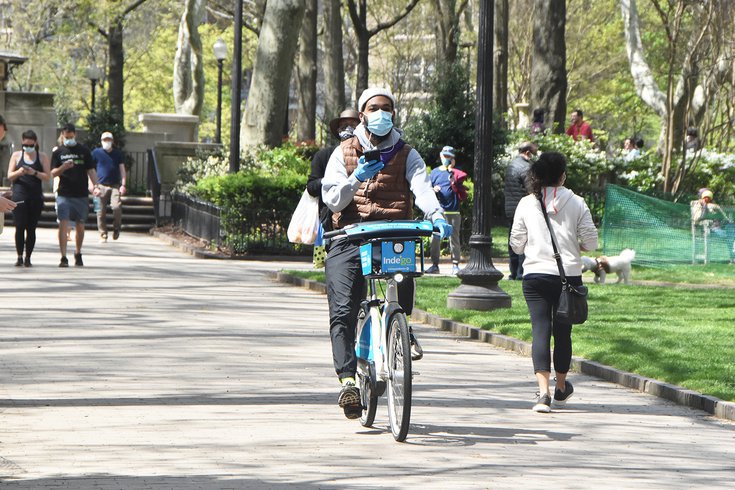
April 20, 2021
 HUGHE DILLON/for PhillyVoice
HUGHE DILLON/for PhillyVoice
Philadelphia Health Commissioner Dr. Thomas Farley does not plan to loosen COVID-19 restrictions in the city by the end of April. Case counts in the city have been climbing over the past month.
Philadelphia will not make any changes to its COVID-19 restrictions before the end of April, citing the highest case counts since the surge that followed the holiday season.
Health Commissioner Dr. Thomas Farley said Tuesday that the concerning trend in cases requires ongoing caution, specifically around indoor dining at restaurants.
"We already have too many unnecessary deaths, we don't need any more," Farley said.
Though Philadelphia has eased some indoor and outdoor restrictions in recent months — including permitting fan attendance at sports venues — the city did not adopt the changes Pennsylvania made in early April to increase indoor dining capacities to 75% and allow bar service to resume. Occupancy limits at gyms and entertainment facilities such as casinos, theaters and malls were also raised to 75% capacities elsewhere in the state.
Currently, Philadelphia restaurants are allowed to serve up to 25% of their maximum occupancy for indoor dining, or up to 50% capacity if they are able to meet the health department's ventilation standards. Indoor catered social events are still prohibited, with the exception of some business conferences at hotels, and guidance for other businesses remains more strict than in the rest of the state.
For mask use, Farley said changing the existing mandate or making it more lax for people who are vaccinated defeats the purpose of keeping guidelines clear about how to prevent spread of the virus. The city does not mandate that masks be worn outdoors in public settings, but residents still are strongly encouraged to wear them if they are in close proximity to others, whether they are vaccinated or not.
"If you want people to follow rules, it's really important that they be as simple as possible and as clear as possible," Farley stated. "More complicated rules about — well, you can do this if you're this sort of person, but not if you're this sort of person — that tends to erode the social norm, the expectation that people are wearing masks. I would not be a big fan of making it too complicated when mask use is so important and so simple, and really not that inconvenient."
For the week ending April 17, Philadelphia averaged 586 new cases of COVID-19 per day, with a test positivity rate of 7.3%. Those numbers remain incomplete and will likely rise higher than the previous week's average of 591 cases per day and 7.6% test positivity rate, Farley said.
"People are increasingly out and around, getting together with others, dropping their guard, not wearing masks — and we are seeing variants representing an increasing fraction of the viruses that are circulating," Farley said. "These variant viruses are prevented by vaccination, but they are more infectious and more likely to spread from one person to the other than the version of the virus that was circulating a few months ago, or even a few weeks ago."
The upward trend in cases comes despite broad availability of the COVID-19 vaccine as of last Friday. The health department acknowledged that demand for vaccines in this phase has not been as immediate as anticipated in connection with the change. Farley said he expects that this stage of vaccination may unfold in smaller waves over the next several months.
The city has made accessing vaccines easier by allowing walk-ups at city-run and FEMA-supported clinics. An appointment scheduling website is also now available to book slots for various provider sites in Philadelphia.
Farley said there's no specific percentage of vaccinations among city residents that would signal a return to normal and a loosening of remaining restrictions.
"We simply want it to be as high as possible," he said. "You hear people talk about herd immunity as if it's either you have it or you don't. It doesn't work that way. It's in general the higher the percentage of people vaccinated, the more the unvaccinated people are protected. We will learn — and the rest of the nation will learn — how many people are willing to be vaccinated."
As of Monday evening, there were at least 680,000 people from Philadelphia who had at least one dose of a COVID-19 vaccine and 451,000 people from the city who were fully vaccinated. According to CDC data, approximately 51% of Philadelphia residents over the age of 65 have been fully vaccinated.